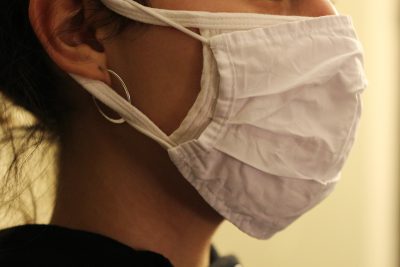As COVID-19 protocols continue through Boston University’s second semester with the continuation of the Learn from Anywhere model, some community members noticed varying levels of adherence to health protocols, as new variants arise and cases grow.

Sharon Zou, a freshman in the College of Arts and Sciences, said the length of the pandemic could be causing more people to become careless in regard to COVID-19 guidelines.
“I feel like there are people who are getting lax on following the rules because [of] COVID fatigue,” Zou said. “I think there are students who should definitely do a better job, but there are also people who are continuously following the rules.”
The University’s F— it Won’t Cut It campaign began recommending that students start adding another barrier of protection by doubling up on masks this semester.
In a tweet Wednesday, the group cited a report from the Centers for Disease Control and Prevention and an article by The Wall Street Journal about the effectiveness of added mask protection, writing “Two masks are better than one.”
Gwyneth Burns, a junior in the College of Communication and Public Relations Manager at F— it Won’t Cut It, wrote in an email the campaign supports a commitment to COVID-19 regulations.
“We’re encouraging the community to stay vigilant and continue following public health guidelines,” Burns wrote.
She added the CDC announced Wednesday new guidance about masks, encouraging wearing a tightly-fit surgical mask or “double masking,” which Burns wrote she hopes the community will adopt.
Ronald Corley is a professor of microbiology and director of National Emerging Infectious Diseases Laboratories at BU.
He said COVID-19 is spread from person to person through respiratory drops, which can include coughing, breathing, and even talking without a mask covering your mouth.
“One of the interesting features of SARS-CoV-2, the virus that causes COVID-19, is that people who are infected with this virus can spread it before they’re symptomatic,” Corley said. “Which is one of the reasons why we find ourselves in this pandemic.”
As far as mask wearing, Corley said the type of mask — the number of layers, type of material and fit — is essential because it directly relates to how these respiratory droplets can spread.
“One layer of cloth you could still breathe through,” he said. “If you just have on your mask and you blow, hold your hand up a few inches away and you blow and you can feel it, you know that mask is not preventing the spread of all the respiratory droplets.”
Corley said he started doubling up on masks two or three months ago.
“The general rule of thumb is at least three layers is what you should be striving for,” Corley said. “So a good three-layer surgical mask, if it fits well. Otherwise, paper mask and then a cloth mask on top of it.”
He added four-layer masks, while difficult to find, are also considered to be the “best protection.”
He said the mask’s fit is also important. Sometimes, when people wear only one mask, there are noticeable holes on the sides of their face that particles can get through, he said.
“The reason people say wear two masks, if you wear cloth masks on top of a paper mask, sometimes you get a much better fit around your face as a result of that,” Corley said, “and that better fit gives you more protection.”
Although Corley recognizes the success of BU’s testing program and contact tracing, he said there is a continued need for individuals to stay vigilant and continue practicing safe protocols.
Zou, who said she works in Residence Life, felt similarly about urging her fellow Terriers to take steps to protect themselves and the campus community.
She said though the majority of students have been continuously following the rules, she also recognized that certain students have become more relaxed.
“I feel like there are definitely groups of people who are not following rules and then going to parties and gathering together,” Zou said. “Students definitely need to do a better job of not letting that happen.”
Another CAS freshman, Hailey Moon, said BU also could do a better job of educating its students and staff about quality masks, though she said F— it Won’t Cut it has been helpful.
“They could increase mask education, which one’s most effective,” she said. “More on which types are good, if it doesn’t quite fit, how to make it fit, how to DIY masks.”
She said she has seen some people, including a professor, wearing a neck gaiter — a fabric tube that stretches over a person’s head, covering their nose to the bottom of their neck.
Corley said the issue with neck gaiters is they consist of only a single cloth layer. Some studies, he said, have even proven that neck gaiters facilitate the spread of the virus.
“It can actually help break up the respiratory droplets to even smaller droplets and those tend to stay in the air longer,” he said. “That makes them in fact, in some respects, not only not particularly effective, but actually potentially more dangerous.”
Corley said there is still much to learn about how vaccine rollout will affect the pandemic — such as if the mRNA vaccines can prevent a vaccinated individual from spreading the vaccine.
“We only know they protect against disease symptoms,” Corley said. “There’s still a lot that we need to learn, and we’ll only learn that over time, as more and more people are vaccinated, and then they are studied, following for long periods of time after their vaccination.”
Burns wrote she hopes the community continues to be proactive in the fight against COVID-19 and follows new guidelines.
“Double masking is another little step that makes a bigger difference,” she wrote. “We’re looking forward to seeing more people double masking on campus and around Boston.”



























































































































